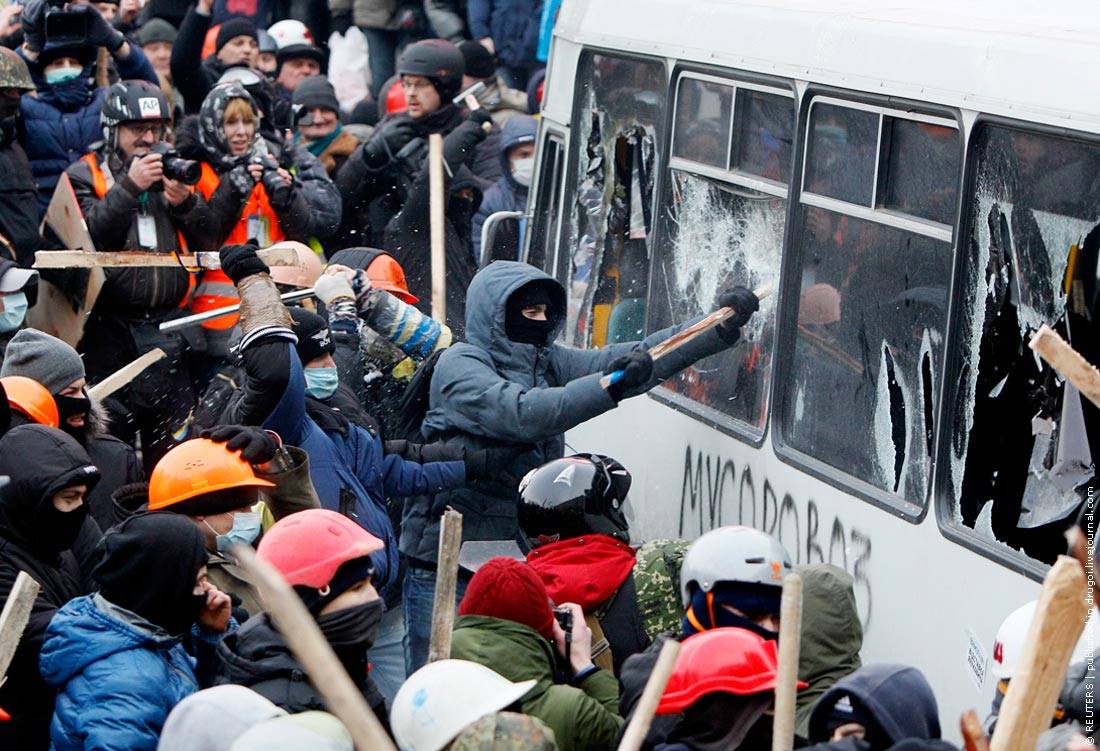Today is the anniversary of the events on Vulytsia Hrushevskoho.
On this day the Right Sector fighters decided to transform the protests at the Maidan from a non-violent movement to one of a show of force, ending what had been until then a stalemate. From that day onward the whole world would know about the Right Sector. Unlike acts of extremism, here was an instance of a national uprising, the difference between extremism and insurgency being the conduct of the people. The nation fears extremists, but the people overwhelmingly supported the insurgents. There were not only young men with their faces hidden who were throwing stones and Molotov cocktails at the Berkut riot police. There were also women and even glamorous young women who were digging up the bricks from the road for them, while elderly ladies were bringing bottles to be used in making Molotov cocktails.

This overwhelming support meant that the time for forceful action was neither premature nor too late, but that the timing was exactly right.
Everyone who was at the Maidan during this time will remember how it was, starting with the Parliament passing the "dictatorship laws" on January 16 and on the 19, a Sunday, during the next Viche public assembly, the “official” leaders of the Maidan proved themselves to be unequal to the challenge of leading the protests, being convinced that it was important to be restrained under any circumstances. That’s when an opportunity arose for those who for years firmly believed that the fate of one’s homeland can never be brokered through the decisions of special interest lobby groups.
My personal recollections are that that day was like any other: I had no inkling that anything would transpire other than the regular Sunday meeting, the Viche. In fact, the most interesting part of the day was the problems I was having with my camera equipment. I was still taking pictures, but only on my cell phone, using up two batteries. When the stones began flying, I ran for cover at the Dynamo stadium (it hadn’t been set on fire yet). I spent 15 minutes taking pictures there under the archway, and then I ventured out to take more pictures. I won’t have believed you if you told me then that two and a half months later I would be in a war...

I inhaled an awful amount of teargas, since gas rises, and I was the last one to be rescued from the roof of a bus before they torched it. I was coughing from that gas until the end of March.
It is not surprising that after eight months at the front lines of war, these memories have not lost any of their clarity. Today it is exactly one year that we are in a state of war.
How quickly this time has passed, and how much has changed since then. Remember how difficult it was at the Maidan to obtain protective gear? Or even an ordinary soviet-era helmet? Remember how our men set about equipping themselves, anyway they could, with the result being that they looked like characters from fantasy movies?
Then, as now, we have our people to thank for their help during the Maidan in the same way they are helping us at the front lines; we now have military equipment that for years during training exercises we could only dream about. With a little more effort and we might even get to a point where we have enough weapons.
That day, people began to feel like they belonged to a Nation, in the sense that we were one living organism, with a division of labour into the front and rear, all learning to work together. It still remained unknown to us what it would yet take to transform us from a force major, successfully bringing about a change in the government, into a people’s war, a righteous war (c). From then on, from the 19th of January, the Maidan finally took on a life of its own, irrespective of the direction being taken by its “official” leaders. Similarly today, the common people of the nation are defending their homeland, openly ignoring the elite leadership of the government together with their “appeasement makers."
Ukrainian self-organization will go down in history.


